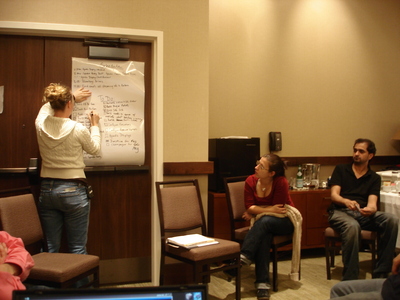We are developing the social individualist meta-context for the future. From the very serious to the extremely frivolous... lets see what is on the mind of the Samizdata people.
Samizdata, derived from Samizdat /n. - a system of clandestine publication of banned literature in the USSR [Russ.,= self-publishing house]
|
Blogger Patrick Lasswell had a real world encounter of the ‘dial 911’ kind that shows whilst civic virtue is a good thing, it is even better when the upstanding citizen has a firearm to hand when investigating a disturbance.
Hiding in my front yard from a shotgun armed maniac last night made me reflect on my libertarian leanings. The Second Amendment never seemed so clear to me as an individual right as I waited for the police to arrive, and waited. I was carrying only a telephone and a flashlight, and updating the 911 operator as the lunatic passed twenty yards from my position it occurred to me how very much I appreciate owning rifles, and how very, very far away they were at the moment.
Read the whole thing. Fortunately the encounter in question was ‘merely’ alarming, yet clearly there was potentially for a shooting and thus Patrick was in violation of Jeff Cooper’s First Rule of Gunfights: have a gun.
Patrick, you live in the USA so you have no excuse to emulate the disarmed civilian population of Britain.
From late June of this year until earlier this month my personal blog stopped working. All previous such outages had been either very brief, lasting only a few days at worst, or they were longer but purely voluntary breaks, while I went off on holiday or just recharged the blogging batteries. But this summer’s break was different. For boring bloggage reasons involving comment spam attacks (who by?) and Supergeeks who wouldn’t answer the phone, the details of which I will spare you mostly because I don’t understand them (although I hope and believe that my Geeks and Supergeeks do), my personal blog stoppage went on, and on, and on, and on, for the best part of three months. The stoppage only stopped about three weeks ago, and when it did I had become so used to not blogging that it actually took me about another week to jump back into it again.
When I started personal blogging, I supposed that if my personal blog was ever seriously interrupted, I would welcome the outlet offered by the other blogs that I have posting rights to, such as the Transport Blog, and of course Samizdata, to write whatever else I felt like blogging that fitted their remits. But instead, I found that I did not want to blog at all. Unable to avail myself of it, I found that blogging, anywhere, had lost its charm. I still wrote some bits for money, although the frequency of that also slowed during the summer. But that was work. It was not, you know, blogging. Why did this happen? Why did losing my own blog mean that my desire to contribute to anyone else’s blog evaporated?
The best answer I can offer is that for me, wandering about on the internet looking for stuff to mention on Samizdata or Transport Blog constantly results also in stuff I want to comment on and link to chez moi. So if chez moi is no longer functioning, it’s like having a gag stuffed in my face. I do not actually blog about everything I find that is of interest to me. But it hurts if I can’t. Starting a personal blog meant that, for me, the internet had finally become fully interactive. I can say whatever I like about it, to it, on it. Being unable to say whatever I liked, I switched back to reading books.
For those unfamiliar with Alisher Usmanov, he is a Soviet era criminal (and I do not mean a dissident) and multi-gazillionare oligarch who is trying to ‘do an Abramovich’ and buy English football club Arsenal. More to the point he is also the man responsible for taking Tim Ireland’s UK based Bloggerheads off-line for pointing out his criminal background (and thereby also taking down Boris Johnson’s blog as ‘collateral damage’ as he was managed by Bloggerheads).
I must confess that I am a couple days late to this fight for the inexcusable reason that I simply cannot abide Tim Ireland, but in truth that has nothing to do with the outrageousness of some jumped up plutocrat throwing his weight around like this. However much I might dislike the notion I am forced to support Tim Ireland unequivocally.
As Mr. Eugenides aptly puts it:
And let’s be clear on this point; these blogs are down not because Usmanov has been libelled, but because he says he’s been libelled, and has a room full of paid monkeys sitting at typewriters firing off threatening letters to that effect.
I don’t give a shit about this character, or Arsenal FC (no offence to any Gooners out there); nor do I share all or even most of Tim Ireland or Craig Murray’s politics. But that’s far from the point. If you can be silenced for calling a businessman a crook, then you can be silenced for calling a politician a crook, too. Then it’s everyone’s problem.
It is for reasons like this that Samizdata is hosted in the USA, where I have no doubt whatsoever that should the likes of Schillings, Alisher Usmanov’s solicitors, approach my hosting company with a demand they pull the plug because I said something mean about some porcine thug-in-a-suit, they would be calmly invited to go get a US court order requiring them to take the site down (good luck with that) and until they do, they should please feel free to go fuck themselves.
The First Amendment to the US Constitution is not the source of any right, it is just a legal tool used by Americans in America to secure the natural right all people have to express themselves. But in this networked world we have, it actually has the unlooked for effect of extending a significant degree of that protection to other people across the world who write from foreign keyboards about foreign things for foreign audiences, hosted on a server in the USA. I find that quite interesting.
Michael Skube is having a fit about the demise of what sounds like beautiful, beeeaaauuudiful journalism in Blogs: All the noise that fits.
The more important the story, the more incidental our opinions become. Something larger is needed: the patient sifting of fact, the acknowledgment that assertion is not evidence and, as the best writers understand, the depiction of real life. Reasoned argument, as well as top-of-the-head comment on the blogosphere, will follow soon enough, and it should. But what lodges in the memory, and sometimes knifes us in the heart, is the fidelity with which a writer observes and tells. The word has lost its luster, but we once called that reporting.
Who’d have guessed that he’s describing journalism in the above?! Skube reads like an old journalist pro (and I use that word in the loosest possible sense) who bemoans the fact that his hard-earned ‘right’ to be published is being trampled upon by the barbaric hoards of bloggers. Well, the Big Editor in the Sky is no longer, there is just the internet with the online equivalent of printing press. With distribution bundled in. The bargain of the millennium. But the likes of Skube want to convince the world (or what’s left of those who haven’t taken to blogging) that this is bad for the luxury brands of MSM. We already know that, Michael. The real luxury is not having someone like you misrepresent what people are, do and mean by your selective ‘fact-sifting’, out of context quoting, and sloppy reporting. I am not accusing Michael Skube of such practices here, I’ll leave that to Ed Cone, I am targeting the entire profession here. I am an equal opportunity ranter.
It always amuses me – right after it annoys me – how his type (Andrew Keen et al) only trawl through the bad stuff online and construct their argument around the worst they can find. Granted, nowadays they find a parenthesis or two to reluctantly admit that bloggers have some influence.. but no matter, if things continue this way, we are all dooomed. DOOOOMED! Well, yeah, dude.
Instead of supporting their arguments about the plebeian nature of the blogosphere and the rubbish we are all inundated with, they merely demonstrate their lack of skill in navigating blogs and finding the daily gems. So Jay Rosen of PressThink put together a blowback that’s worth bookmarking – a collective effort of many to list examples of a blogger doing a journalist’s job. It has also been published in LA Times. For the record.
cross-posted from Media Influencer
I did not want to write about this at the time when the article came out, since I thought why should I give any more publicity to the fascist – that is surely an accurate description – Neil Clark than he already got. But having thought things through and seen some commentary, such as by Stephen Pollard, I decided to give my two pence on the matter.
Clark is clearly fascinated by and attracted to, tyrants. He has defend Milosovic, for example, with a gusto that goes beyond whatever reasonable doubts one might have about who were the bad guys in the Balkan conflict. He has now argued that Iraqi interpreters trying to seek asylum should be left to their often violent fates. I wonder how he would have felt about the German interpreters who worked with the Allied armed forces in the latter stages of WW2, for instance? Clark is a truly strange beast. It is hard to think of him as “left-wing”, still less “progressive” in any coherent sense whatever. He is a socialist in his attachment to state central planning and hatred of capitalism, but then that was a trait of the far right (but then again, do the words left and right in this political sense make any sense whatever?). The unifying trait of this character is a love of violent leaders, so long as they are against Britain and the evil US. Paul Johnson, in his book Intellectuals, demonstrates how often men who like to paint themselves as being on the side of the little guy are attracted to violence. I sometimes wonder whether Clark falls into the same trap. If I were a Christian, I’d pray for his soul.
A few months ago a student called Oli Cooper wrote to me to say that he was setting up a Libertarian Society at University College London. I took him for lunch and he explained his plans and I explained how such groups had worked elsewhere. The society does not officially launch until September but there is already a website and a feisty blog called The Torch.
I learn from the blog that since 1997, there’s been the equivalent of one new criminal offence a day. He beats up the UK government’s plans for extending punishment without trial. In one post he agrees with the hard-right Tory clique the Cornerstone Group but explains, lest readers get the wrong impression, that normally the Group “represents just about everything that’s wrong with the Conservative Party. They’re Kinder, Küche, Kirche sort of authoritarians, keen on protecting the privileges of the elite.” Ouch.
I suspect we will be hearing a lot more from the UCL over the next couple of years.
The first leg of my journey began on May 17th with a Belfast to Manhattan direct flight. I had a one day layover before another early morning start for a train to Boston. This gig, the JPMorgan Technology ’07 Conference, was one of my big ones of the year. I worked as a backstage Tech on this investor conference from May 19th to the 23rd.
For those not in the heart of the tech game, these conferences are important events. Hundreds of millions exchange hands based on the information released by CEO’s and CFO’s and in back room wheeling and dealing. That’s why I get paid well to travel a long distance just to be a webcast editor. They cannot afford failure, and if things do go wrong they want people who are overskilled enough to not panic and to solve the problem.
Our glorious leader tried to foresee the unforseeable or at the very least make sure everyone knew what they had to do.

Behind the scenes: a pre-show Tech briefing.
Photo: copyright Dale Amon, All Rights Reserved
Despite all the prep and redundancy and effort… gremlins will have their day. Just as the lights came up during an early Monday morning session… the entire hotel blacked out. Lighting boards. Sound boards. Television cameras. The video mixing desk. Registration servers. Video projectors. Streaming servers… and of course the Editing stations of my demesne. All hell broke loose… but in less than 15 minutes the hotel power problem was found, circuits repatched and every team had their gear synced up and back on the air. That’s how the pro’s do it.

No expense is spared. Well, almost…anyone got a match? A spare nuclear power plant?
Photo: copyright Dale Amon, All Rights Reserved
I did not get to see much of the show unless you count occasionally looking over my shoulder and watching it in reverse.

My view of the show.
Photo: copyright Dale Amon, All Rights Reserved
The hours are long but there are perks working a job like this. For one, I get a very nice free room, and these things are not held in one star squats. As you can see, I had a lovely view of the harbour. I also had a panorama of the Charles River and the Boston skyline.
To top it off, the team is one of the best I have ever worked with. ‘The craic is mighty’ as one might hear in Belfast.

Some perks come with the job: a view of Boston Harbour from my room.
Photo: copyright Dale Amon, All Rights Reserved
On the last day I rushed to finish my Editing tasks in time to strike my gear and flag a taxi to the railway station. I had a flight out of JFK to catch at 0500 and I left Boston only twelve hours earlier. The train takes a very scenic coastal route. I highly recommend the Boston to New York train for that and as a way to not go through the indignities of airport security.

There are a lot of boats on the New England coast…
Photo: copyright Dale Amon, All Rights Reserved
At the moment I am sitting at the house of a Physicist and Venture capitalist friend in Connecticut in between jobs north of DC and a trip out to Laramie to push ahead on my latest venture. That is why I have had some time for posting again. These last few weeks on the road have been mad but have had some fun times as well, so I will perhaps do a few travel posts while I have the chance.
If you get the impression that Samidatistas are world travellers… I wonder whatever gave you that idea? 😉
A quick plug for this excellent weblog of Daniel Ben-Ami, a freelance journalist who knows his economics. Daniel holds the heretical belief that material prosperity is a good thing and has debunked some of the recent nonsense about how people are made “unhappy” by material wealth. His site is definitely worth a regular visit.
I mean really geeky! But cool nevertheless.
This is not me. Save as a result of incompetent shaving, or depressed non-shaving, I have never had a beard. And not more than a couple of millimetres long, in any case. My verse output is formal exercises and satyrical squibs. One directory thinks there are eight Guy Herberts in Britain. More than one of those are, or were, me. I do not know whether any are him.
Dave Walker sees more online samizdat, which he deftly names samizdata. Sounds familiar?
The original Samizdat consisted of textual material intended to criticise and subvert repressive political regimes – it was surreptitiously copied and circulated in a “pass it on to your trustworthy friends” manner.
Today’s samizdata – such as a certain hex string which, in the last month, has spread from one blog across Digg and thence to thousands of blogs and sites – is material which can now also be intended to subvert repressive data management regimes.
In the days of the Cold War, samizdat was spread between people who typically knew each other, whereas today’s typical samizdata – even though it could conceivably propagate via USB memory sticks in a similar manner – employs more of a “scattergun” approach. This may well be down to the fact that secret police organisations in Cold War times were not omniscient; by contrast, today’s data management Politburos have access to Google, so the top priority for samizdata proponents is, as well as concealing their identities, ensuring that their data is propagated so widely that the probability of all the sites carrying the data being gagged becomes as close to infinitesimal as possible.
Before the AACS product key, the last major piece of data management-subverting samizdata was DeCSS. DeCSS spread by website, newsgroup and T-shirt, the AACS key has spread much more quickly by blog, wiki and tag indexer. It is a sign of the times, although I am not about to predict that AACS product key T-shirts won’t happen soon.
While the contribution of samizdat and its influence on populations to the eventual fall of various regimes is discussed in detail elsewhere, the effects of samizdata (online samizdata for the purposes of this discussion) are also not entirely straightforward; DeCSS and the falling cost of embeddable processing power clearly influenced AACS, particularly in the case of the upgradable key. However, as AACS could be broken once, on the grounds that key and encrypted material are stored together in a device under the physical control of the user, it can be broken again. The most accurate prediction I can make is that we’ll be seeing a lot more samizdata in future.
|
Who Are We? The Samizdata people are a bunch of sinister and heavily armed globalist illuminati who seek to infect the entire world with the values of personal liberty and several property. Amongst our many crimes is a sense of humour and the intermittent use of British spelling.
We are also a varied group made up of social individualists, classical liberals, whigs, libertarians, extropians, futurists, ‘Porcupines’, Karl Popper fetishists, recovering neo-conservatives, crazed Ayn Rand worshipers, over-caffeinated Virginia Postrel devotees, witty Frédéric Bastiat wannabes, cypherpunks, minarchists, kritarchists and wild-eyed anarcho-capitalists from Britain, North America, Australia and Europe.
|









